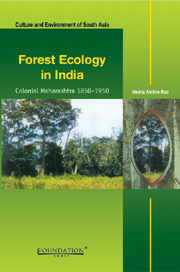Book contents
- Frontmatter
- Contents
- Preface
- Glossary
- Maps
- 1 Introduction
- 2 Pre-Colonial Maharashtra
- 3 Early British Management of Forests
- 4 Evolution of Forest Policy and Forest Acts of 1865 and 1878
- 5 Implementation of 1878 Act
- 6 Forest Policy During 1900–1950
- 7 People's Resistance
- 8 Conclusion
- Appendix - I
- Appendix - II
- Bibliography
- Index
7 - People's Resistance
Published online by Cambridge University Press: 26 October 2011
- Frontmatter
- Contents
- Preface
- Glossary
- Maps
- 1 Introduction
- 2 Pre-Colonial Maharashtra
- 3 Early British Management of Forests
- 4 Evolution of Forest Policy and Forest Acts of 1865 and 1878
- 5 Implementation of 1878 Act
- 6 Forest Policy During 1900–1950
- 7 People's Resistance
- 8 Conclusion
- Appendix - I
- Appendix - II
- Bibliography
- Index
Summary
“…The new forest rules have fallen like a fatal blight – like a thunderbolt from a clear sky. By one direful stroke of the pen ‘the man of the jungles’ finds himself at once a proscribed outcast in his own wilds. His hills and jungle fastnesses are suddenly proclaimed to be State forests. Every vegetable and mineral substance therein is declared to be ‘forest produce.’ All forest produce is declared to belong to the Crown. And no one is allowed to move any forest produce whatever without the formal permission of the ‘jungle-wallah sahib,’ the new forest King…”
A letter to the Editor “Forest Conservancy in Bombay”, Indian Forester, September, 1886, p. 303.The British Forest Department and its forest policy had an everlasting and far-reaching impact on the Indian society. A society, which was primarily agrarian in nature, had a very close dependence on forests. It was not only the forest dwelling tribal communities which were dependent on forests but the entire rural population, agriculture being their main source of income, was dependent on forests in some way or the other. With their sustainable style of living, in the normal conditions poor peasants were dependent on forests for their supplementary needs. Artisans depended on them for their raw material. In case of natural calamities too, forest was the most important alternative to these communities on which they could rely for their survival. Also they could migrate from one place to another in case of famine or drought or any other disaster. Land without cultivation did not have any commercial value. However, with the establishment of the Forest Department, the poor people lost their supplementary source of livelihood.
- Type
- Chapter
- Information
- Forest Ecology in IndiaColonial Maharashtra, 1850-1950, pp. 156 - 210Publisher: Foundation BooksPrint publication year: 2007



